- Home
- Bette Lee Crosby
The Twelfth Child Page 11
The Twelfth Child Read online
Page 11
That January was the coldest Richmond had seen in many years. On a bitter morning when the trees were bare of leaves and the sky such a dark gray it looked to be night, a noisy black crow settled on the window sill. Abigail believed it to be the very same bird that summer before last perched in the tree outside of her old bedroom – the bird had the icy stare of a black-robed clergyman and she sensed it had been following her ever since she left Chestnut Ridge. Last summer she had seen sparrows and bright red cardinals nesting in the lilac trees, now there was only one hateful crow gleefully cackling at the miserable fortune that had fallen upon her. Abigail rapped hard against the windowpane but the nasty bird pecked at the place her hand had touched and cawed arrogantly. She pictured Preacher Broody banging his fist against the pulpit and hammering home the message as ye sow, so shall ye reap.
Ida Jean Meredith, who was a frail woman to begin with, died in the spring of 1930, just one month before the bank foreclosed on the two-story pink house and by some odd circumstance, the very same year the rhododendrons never bloomed.
For the first time in her life Abigail was alone, so alone that she took to talking to inanimate objects – a chair, a table, a cooking pot. “I don’t expect you’d know what time it is,” she’d say to a chest of drawers, or mumble some question as to the state of the weather as she passed by the sofa. Without the responsibility of doing for Miss Ida she became lost and wandered aimlessly from room to room, forgetting to eat and falling asleep at odd times and in odd places. One afternoon she awoke draped across Miss Ida’s desk – the inkwell tipped over and a blue-black stain on her left cheek. She might have continued on that way, except that three weeks after the funeral, Harold Wigbottom, who was Miss Meredith’s attorney, knocked at the door and told her she had to be out of the house by the end of the month.
“Miss Meredith willed her entire estate to The Artists and Poets League,” he said. “They plan to take possession of the house and it’s furnishings on May first.”
“But,” Abigail stuttered, “I’m living here!”
“You can stay until April thirtieth,” he said. “No longer. I regret that such is the circumstance, but –” he shrugged then doffed his hat and walked off as if the conversation had been of little significance.
“Where am I to go?” she called after him, but Mister Wigbottom rounded the walkway and kept going. As soon as the door clicked closed, Abigail threw herself onto the sofa and started to bawl. She pounded her fists against the pillows and cried for hours on end, she cried until it felt as though there could be no more tears inside of her, then sometime during the wee hours of the morning she fell asleep on the sofa.
That night she heard thundering hooves pounding against the pavement, she saw wild horses running through the streets of Richmond. At the forefront of the pack was Malvania – his mane billowing recklessly, his nostrils flared and snorting, astride his back was a straight up Abigail with her nose tilted in the air and a look of determination in her eyes. As the herd thundered closer to the center of town, people clambered back against the walls of the buildings, all but one man, that one man was her father. He planted himself in the pathway of the horses and stood ground. Abigail could sense a collision coming, a collision that would shatter one of them into tiny shards of hopelessness. She had to do something. She spurred Malvania into a hard right and the herd followed, circling around him. When Abigail looked back, her father was standing there, his arms folded square across his chest and a look of hatred frozen on his face.
Abigail awoke with a start – she suddenly understood why the question about her father’s forgiveness had never been answered. It was because there was no forgiveness, there never would be. Any thoughts she’d had about going home were no more than foolish daydreams. She’d made her decision the day she stepped on a train bound for Richmond. Now, there was nothing for her in Chestnut Ridge – nothing but the collision that would reduce her to a fragment of hopelessness. There was no going back now, there never had been.
On April thirtieth Abigail closed the door to Miss Ida’s house and turned back only long enough to slip the key beneath the doormat as she’d been instructed to do. She trudged across town to a small flat on the third floor of an apartment building. A flat that had one tiny window overlooking an airshaft and a narrow bed left there by a previous tenant. It was only temporary, she told herself as she handed the landlord seven dollars for the month’s rent. Abigail planned to get a job and move on to a better place, a place where sunlight sprawled across the floor and the scent of night blooming jasmine drifted in on the evening breeze. It’s only temporary she reminded herself as a stream of tears rolled from her eyes.
The following morning Abigail tugged a black wool suit that had belonged to Miss Meredith from the bottom of her valise – it was a bit dated and heavier than the season warranted but she smoothed the wrinkles from the skirt, dressed herself in it and left the building. Once out on Cleary Street, she crossed over to Hansen Drive and turned left toward the business district, choosing to walk rather than spend the money for a trolley. She tromped in and out of every building on Central Boulevard inquiring about employment, but there was no work to be had. “Sorry,” they’d say and squash the door closed in her face. That night she returned to the flat exhausted and soaked through with perspiration.
The next day Abigail marched herself downtown again; this time she inquired at the newspaper office, the hospital, the bus company and every doctor’s office in town, but everywhere she went it was the same mournful answer – “No jobs.” After a week of searching, she began to ration the remaining bit of foodstuff she’d brought from Miss Meredith’s house. She found she could make do with one meal a day and a sparse one at that. A can of sardines could be stretched out over three days and a small size muffin over two. She found a bakery that sold perfectly good two day old bread for three cents. When there was nothing but a can of black pepper left in the cupboard, she bought a jar of peanut butter and a tub of grape jelly, and lived on those sandwiches for a full month.
Abigail was down to her last dollar when she met Gloria Polanski.
It happened on a July afternoon, in the full heat of the day, when she was sitting on a bench in the park across from the GovernmentServicesBuilding. “Fill out an application,” they’d said, “We’ll let you know if something turns up.” But Abigail understood that this was something people said to be polite – nothing would turn up, nothing ever did, which was why she was crying.
Gloria plopped down on the same bench and started eating a foot long sausage sandwich. “You hungry?” she asked, then broke off a good-sized piece of the sandwich and held it out. “Go ahead,” she said, “I already ate a big breakfast.” Gloria had a broad smile and the curvaceous body of a person who seldom skipped meals.
Abigail paused amid a snuffle, “You sure?” she asked.
Gloria nodded. “You’d be doing me a favor. I probably ought to lose some weight, but I got terrible will power.”
Abigail took the piece of sandwich and chomped down on it. “Oh Lord, this is so delicious!” she said, licking a spot of grease from her hand. “I haven’t had a piece of meat in months!”
“You out of work?” Gloria pulled a banana from her purse, broke off a section and passed it over to Abigail.
“Uh-huh.” Abigail shoved a chunk of banana into her mouth and kept right on talking. “I’ve been everywhere and there’s not a single job in this entire city. I can even type – got my own typewriter – but that doesn’t make a bean of difference. ‘Sorry,’ they say, ‘we don’t have any jobs – not even for men.’ Like it would make a difference if a man was starving to death!”
“You really know how to type?”
Abigail nodded as she was swallowing the last of her banana. “Miss Meredith taught me. She’s the woman I used to work for.”
“How come you quit?”
“I didn’t. She died.”
“Rotten luck.” Gloria pulled out two chocolate cookies wrappe
d in wax paper and passed one to Abigail. “You got family?”
“In Chestnut Ridge. Not that I could lay claim to them since I ran off. Papa wouldn’t let me back even if I had the train fare, which I don’t have.” Abigail wrinkled her nose and grimaced at the thought. “He’s not the forgiving type,” she sighed.
“What about your Mama?”
“She died almost five years ago.”
“Whew. You got bad luck coming and going!”
“I suppose. Some I brought on myself. I probably should of married the Keller boy, like Papa wanted. Henry, he was a fine young man with a rich Daddy, I’d have had things pretty easy if I’d of married him.”
“You love him?”
Abigail paused for a moment, as if she was tallying up the good and bad points of Henry before deciding, then she answered. “Not in a do or die sort of way.”
“Well then, you did the right thing. A person oughtn’t marry unless they’re one-hundred-percent in love.” Gloria pulled out a glass jar, gulped down some of the red liquid then passed it over to Abigail. “Raspberry tea. Want some?”
“Thanks.” Abigail took a drink then handed the jar back.
“Hell’s fire!” Gloria moaned, swiping at a red droplet that drizzled down her bosom. “I’ve ruined my brand new blouse!”
“Ruined?” Abigail laughed, “Why, that’s just a teeny-weenie spot. That comes out when you catch it right away.” Together they walked over to the water fountain on the far side of the park and Abigail using her handkerchief washed the spot from Gloria’s shirt. “Good as new,” she smiled.
As they left the park, Gloria said, “Could be, I might be able to fix you up with a job. That is,” she added, “if you ain’t squirrelly about what you gotta do.”
“Me? Squirrelly? No indeed! Why, I used to scrub out my papa’s chamber pot! I’m one who believes you gotta do what you gotta do.”
Gloria laughed thunderously. “This ain’t no scrub lady job. It’s hostessing.”
“Hostessing?”
“Yeah. Smile, give guys the big eye; let them buy you a drink, stuff like that.”
“A whiskey drink?”
“Whiskey, gin, whatever.”
“But, that’s illegal.”
“Oh well, excuse me for breathing! I thought you was desperate.”
“I am.”
“Well, then.”
“This is a speakeasy, right?”
“Itchy don’t call it no speakeasy, he calls it a club.”
“Can’t the people who work there get arrested?”
“Uh-uh,” Gloria shook her head. “Itchy takes care of the cops.”
Maybe if she hadn’t been hungry for so long, maybe if she wasn’t down to her last dollar and fearful of being evicted, maybe then Abigail would have stopped to think of what her father or Preacher Broody might say about such thing, but as it was she simply smiled and told Gloria that she’d love to get such a job.
“If I get you the job,” Gloria said, “will you teach me how to typewrite?”
“Absolutely!” Abigail answered. “Absolutely!”
Two days later Abigail accompanied Gloria cross-town to Club Lucky. “This is the place?” she gasped when they rapped on the back door of a building that gave the appearance of a closed-down factory.
“Yeah,” Gloria answered with a grin.
Club Lucky was a place where a pair of eyes peered through an opening in the door and then decided whether or not to allow a person inside. There were no introductions, no applications to fill out, no references needed.
It was late afternoon so other than the watchdog who opened the door and an old man stacking glasses on the bar, the club was empty. Gloria guided Abigail through a clutter of empty tables and into a brightly lit back office. “This here’s the girl I told you about, Itchy,” she said and shoved Abigail forward.
Itchy peered over his glasses and told Abigail to swing around so he could get a gander from behind. She’d expected that he might inquire about her previous experience or possibly even ask about her qualifications but she hadn’t thought he’d want to inspect her rump so she just stood there looking bewildered. Gloria suddenly took hold of Abigail’s shoulders and whirled her around. “See that,” she said, “nifty, right?”
“Kinda skinny,” Itchy answered, “but she’ll do.” He lowered his gaze back to the newspaper he’d been reading. “Thirteen bucks a week, plus tips,” he grumbled, “You keep a smile on your face and order champagne when you got a big spender.”
“Yes sir, Mister Itchy,” Abigail answered. She was going to say that it was a true pleasure to be working for him but before she had the chance, Gloria hustled her back out the door.
What Itchy said was true. Abigail had grown thin, bone thin in fact, skinny enough that the blue silk dress hung from her shoulders like a shapeless curtain. She’d chosen that particular dress based upon Gloria’s description of the job – with its pale ivory lace and seed pearls rimming the neckline, it was the most elegant frock in her closet. But she hadn’t worn the dress for well over a year, not since the last time she’d accompanied Miss Meredith to the ballet, and by some odd circumstance, it had come to be weary looking during that time, droopy and tired, lackluster, almost as drab as Abigail imagined herself to be.
“You need something jazzier,” Gloria said. “Something with fringe, maybe?”
Abigail sighed. She’d never pictured herself in fringe, but the sound of it was silky as rosewater and glycerin. “Fringe?” she repeated wistfully.
“Yeah, that’s it!” Gloria squinted at her protégé, then walked full around her as if she were registering a measurement. “You look to be the same size as Lucy; I’ll bet one of her dresses –” Gloria tugged a rose-colored gown splattered with silver beads and rows of fringe from the rack and handed it to Abigail. “Try this.”
“Without asking?” Abigail replied, but she could already see the fringe swaying to and fro as she danced the Charleston.
“Ask who? Lucy? She don’t even work here no more!”
“But . . .”
“These hostess clothes belong to Itchy.”
“You sure . . .” Abigail offered up a half-hearted protest, but as the words rolled from her mouth she untied her own sash and allowed the blue dress to drop to her ankles. The rose-colored gown cascaded across her shoulders, the silver beads clinking softly as rubbed-thin dimes jingling through the bottom of an overcoat pocket. “I sure hope Mister Itchy doesn’t mind,” she mumbled, but by that time she was already grinning at the reflection in the dressing room mirror.
“See!” Gloria said, nodding her approval. “Much better. ‘Course you need some rouge and a bit more lipstick.” That night when Club Lucky opened there was a new hostess on the floor, a girl with darkened eyelashes and rose-colored lips, a girl that didn’t exist a few days ago.
As they walked out onto the floor of Club Lucky, Abigail whispered into her friend’s ear, “Now, what am I supposed to do?”
“Do what I do,” Gloria answered. “Look available. Flirt with the men. Be real polite to the ladies, especially the hoity-toitys.”
“How will I know –”
“You’ll know,” Gloria answered and then she sashayed across the room before there was time to ask anything else. Abigail suddenly felt awkward – a scarlet rose in a garden of white lilies – a child dressed in grown-up clothes. Maybe, she thought, she’d been wrong about the gown – it now seemed somehow gaudy, something a woman of low morals might wear. Trampish. For a long while, she considered going back to the dressing room and resurrecting her blue silk frock, despite its prissy sash. At least that dress wasn’t gilded with silver spangles. Rolling this thought over in her mind, she lingered along the far edge of the room, a spot where a person could slip off without being noticed. But instead of leaving, she stood there shifting her weight from one foot to the other, trying to make herself look inconspicuous, trying to convince herself that the hostessing business was a perfectly proper thin
g.
She couldn’t guess how long she’d been standing there – Ten minutes? Three hours? – But in whatever time had passed, the room became noisy and filled with people. Sounds of raucous laughter ping-ponged from wall to wall and the musicians honked out one brassy tune after another. Abigail tried envisioning herself as a puff of smoke, floating across the room, disappearing through the vent – avoiding the heartbreak of another mistake. She had already started ruminating on how she should never have taken the hostessing job, when a heavy arm settled across her shoulder.
“Hey, Cutie,” a man older than her father said. “Can I buy you a drink?”
“Umm.” Abigail nodded and tried valiantly to dredge up a smile, but it felt like the muscles in her face were paralyzed. “Actually,” she confessed, “I’m a hostess.” She whispered the word hostess.
The man laughed. “New, huh?” At first he had seemed almost threatening, but as he spoke, his expression eased into a rounder, softer countenance and his smile was as kindly as any Abigail had ever seen. She nodded and returned the smile. “Don’t worry, kid,” he said, then took hold of her arm and led her to a small table alongside the bar, “You’ll do fine, you got pizzazz.” He slid the chair out and motioned for her to sit.
As far as Abigail could remember, it was the first time anyone had ever suggested she had pizzazz – in fact, she wasn’t all that certain what the elusive quality actually was. She knew it had nothing to do with making great pies or aspiring to someday be a writer. Pizzazz was a special kind of sparkle reserved for wealthy debutantes and the flapper ladies of Vanity Fair magazine. “Gosh,” she murmured breathlessly, her cheeks blossoming to the same shade of scarlet as her dress.
“Pete,” the man called over to the bartender, “fix us up with some gin and a bottle of champagne for the little lady.” He turned back to the table and said, “I’m assuming Itchy told you to order champagne, right, cutie?”

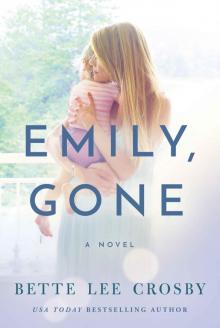 Emily, Gone
Emily, Gone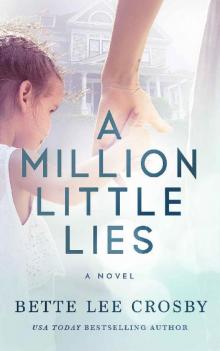 A Million Little Lies
A Million Little Lies Previously Loved Treasures
Previously Loved Treasures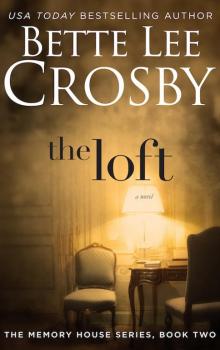 The Loft
The Loft Spare Change
Spare Change Memory House: Memory House Collection (Memory House Series Book 1)
Memory House: Memory House Collection (Memory House Series Book 1) Silver Threads
Silver Threads Wishing for Wonderful: The Serendipity Series, Book 3
Wishing for Wonderful: The Serendipity Series, Book 3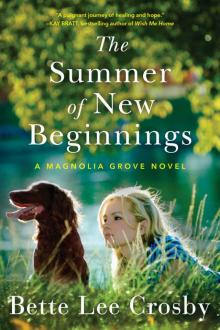 The Summer of New Beginnings: A Magnolia Grove Novel
The Summer of New Beginnings: A Magnolia Grove Novel The Regrets of Cyrus Dodd
The Regrets of Cyrus Dodd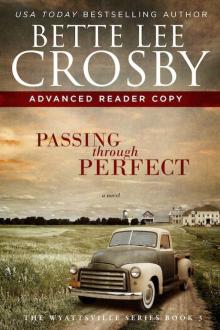 Passing Through Perfect
Passing Through Perfect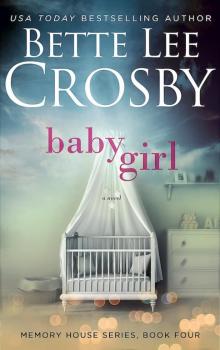 Baby Girl
Baby Girl Jubilee's Journey
Jubilee's Journey Beyond the Carousel
Beyond the Carousel What the Heart Remembers
What the Heart Remembers Cupid's Christmas
Cupid's Christmas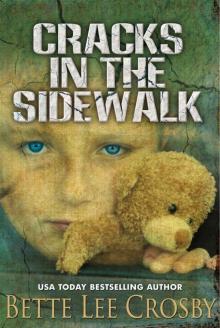 Cracks in the Sidewalk
Cracks in the Sidewalk Blueberry Hill
Blueberry Hill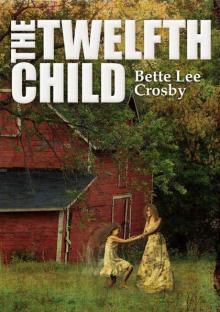 The Twelfth Child
The Twelfth Child A Year of Extraordinary Moments (A Magnolia Grove Novel)
A Year of Extraordinary Moments (A Magnolia Grove Novel)